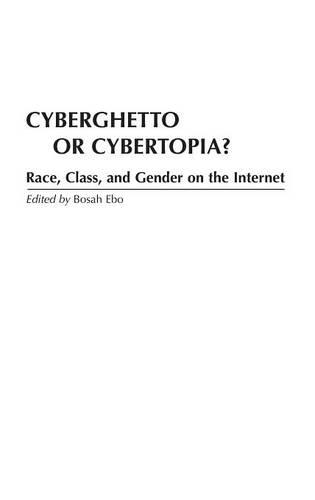
Cyberghetto or Cybertopia: Race, Class, and Gender on the Internet
(Hardback)
Publishing Details
Cyberghetto or Cybertopia: Race, Class, and Gender on the Internet
By (Author) Bosah Ebo
Bloomsbury Publishing PLC
Praeger Publishers Inc
28th July 1998
United States
Classifications
Tertiary Education
Non Fiction
Digital and information technologies: social and ethical aspects
Ethics and moral philosophy
Sociology and anthropology
303.4834
Physical Properties
Hardback
248
Description
Computer-mediated communication and cyberculture are dramatically changing the nature of social relationships. Whether cyberspace will simply retain vestiges of traditional communities with hierarchical social links and class-structured relationships or create new egalitarian social networks remains an open question. The chapters in this volume examine the issue of social justice on the Internet by using a variety of methodological and theoretical perspectives. Political scientists, sociologists, and communications and information systems scholars address issues of race, class, and gender on the Internet in chapters that do not assume any specialized training in computer technology.
Reviews
"The major strengths of Cyberghetto or Cybertopia are that the information can be used to support ad inspire research by students and faculty regarding the Internet and inform policymakers across the country about the technological crisis that may befall their very constituents....[T]his book conveniently packages in-depth contributions that are accessible to academics, public servants, and private industry professions."-Journalism and Mass Communication Quarterly
[G]eneral readers with an interest in the social impact of the Internet should find this absorbing reading.... What the author has to say should be of particular interest to people concerned with lack of funding for education.... This book should be on the reading list for social science, political science, and communications courses. Policy makers in the communication field, and those who seek to influence them, should take the time to read it. Librarians should consider it for acquisition.-PC Update Directory
The major strengths of Cyberghetto or Cybertopia are that the information can be used to support ad inspire research by students and faculty regarding the Internet and inform policymakers across the country about the technological crisis that may befall their very constituents....[T]his book conveniently packages in-depth contributions that are accessible to academics, public servants, and private industry professions.-Journalism and Mass Communication Quarterly
"General readers with an interest in the social impact of the Internet should find this absorbing reading.... What the author has to say should be of particular interest to people concerned with lack of funding for education.... This book should be on the reading list for social science, political science, and communications courses. Policy makers in the communication field, and those who seek to influence them, should take the time to read it. Librarians should consider it for acquisition."-PC Update Directory
"[G]eneral readers with an interest in the social impact of the Internet should find this absorbing reading.... What the author has to say should be of particular interest to people concerned with lack of funding for education.... This book should be on the reading list for social science, political science, and communications courses. Policy makers in the communication field, and those who seek to influence them, should take the time to read it. Librarians should consider it for acquisition."-PC Update Directory
Author Bio
BOSAH EBO is a Professor in the Department of Communication at Rider University, in Lawrenceville, New Jersey. He teaches and writes on international communication, communication ethics, and media and popular culture. His publications include: Media Diplomacy and Foreign Policy: Toward a Theoretical Framework, in News Media and Foreign Relations, and War as Popular Culture: the Gulf Conflict and the Technology of Illusionary Entertainment, in the Journal of American Culture (1995).
